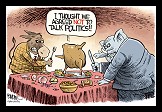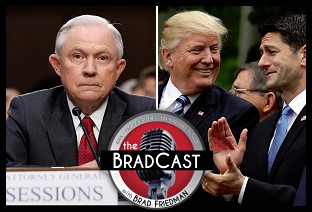 On today's BradCast: Things fell apart quickly for Republican Senate Majority Leader Mitch McConnell over the past 24 hours after the non-partisan Congressional Budget Office announced that the Senate GOP health care scheme would result in 22 million Americans losing health care coverage by 2026, 15 million next year alone. [Audio link to complete show follows below.]
On today's BradCast: Things fell apart quickly for Republican Senate Majority Leader Mitch McConnell over the past 24 hours after the non-partisan Congressional Budget Office announced that the Senate GOP health care scheme would result in 22 million Americans losing health care coverage by 2026, 15 million next year alone. [Audio link to complete show follows below.]
As fellow Republicans balked at McConnell's "Better Care Reconciliation Act" bill, as written, he was forced to back away from his vow to hold a vote on the plan to repeal the Affordable Care Act (ObamaCare) this week. That vote, if it ever comes, will now wait until sometime after the July 4th recess and after more Senators have the chance to hear from constituents about the unpopular legislation.
So, the deal making process begins to win 50 votes for passage, somehow, in the U.S. Senate, as moderate Republicans like Sen. Susan Collins cited the legislation's massive cuts to Medicaid (which other Republicans spent the weekend pretending did not exist) as harmful to her constituents and, specifically, to already struggling rural hospitals in her home state of Maine.
Joining us today to explain the nexus between Medicaid and the health of hospitals are health care reform analysts ALLEN DOBSON and RANDY HAUGHT of Dobson and DaVanzo & Associates. Their new study, published by the Commonwealth Fund, details huge disparities in the effects that the GOP health care plans to slash Medicaid and cut taxes for the wealthy will have on hospitals in Medicaid expansion v. non-expansion states and in urban and rural areas. They also explain how the GOP's attempted cuts to Medicaid will effect all Americans, not only those who directly receive benefits under the program.
"Medicaid is absolutely critical to the survival of the hospital," Dobson explains, particularly in rural areas, as well as places where services were upgraded thanks to the expansion of Medicaid under ObamaCare. If Medicaid is now cut under the GOP plans, "what you've done is you've weakened a hospital. A hospital that is sick financially is a hospital that is sick for everybody in the community. You're not just hurting Medicaid --- you're not just hurting the Medicaid folks, the so-called 'poverty population', you're hurting everybody in the community, because when a hospital can't provide the quality care it would like to to one guy, it can't provide it to the next guy, either."
Dobson, a health economist (he explains what that means) and Haught, a thirty-year data analyst of health care reform legislation and regulations, also offer their thoughts on whether the proposed GOP plans in the House and Senate actually speak to any of the problems Republicans have long cited in regard to ObamaCare, such as claims that it kills jobs and harms the economy. Dobson explains why the ACA arguably helped the economy, and charges the GOP effort in the Senate "is hardly a healthcare bill" and "primarily about taxes, getting set up for a broader tax cut." Haught adds: "For actual health care, we don't see anything in [the GOP plans] that's going to improve the quality of care, nor the access to healthcare coverage."
We also discuss whether a single payer "Medicare-for-All" style health care system is as feasible in the U.S. as it is in other major developed countries, and why the U.S. has yet to adopt such a system.
All of this as Trump tried to rally Republican Senators at the White House today, and McConnell attempts to regroup his caucus in hopes of jamming through the GOP's long-promised repeal of the Affordable Care Act come hell, highwater, or tens of millions of Americans who will no longer have health care coverage in the U.S....
(Snail mail support to "Brad Friedman, 7095 Hollywood Blvd., #594 Los Angeles, CA 90028" always welcome too!)
|


 Sunday 'No Such Agreement' Toons
Sunday 'No Such Agreement' Toons How (and Why!) to 'Extend an Olive Branch' to MAGA Family Members Over the Holidays: 'BradCast' 11/21/24
How (and Why!) to 'Extend an Olive Branch' to MAGA Family Members Over the Holidays: 'BradCast' 11/21/24 'Green News Report' 11/21/24
'Green News Report' 11/21/24
 Former Federal Prosecutor: Trump Must Be Sentenced in NY Before Taking Office Again: 'BradCast' 11/20/24
Former Federal Prosecutor: Trump Must Be Sentenced in NY Before Taking Office Again: 'BradCast' 11/20/24 'Bullet Ballot' Claims, Other Arguments for Hand-Counting 2024 Battleground Votes: 'BradCast' 11/19/24
'Bullet Ballot' Claims, Other Arguments for Hand-Counting 2024 Battleground Votes: 'BradCast' 11/19/24 'Green News Report' 11/19/24
'Green News Report' 11/19/24 Trump Already Violating Law (He Signed!) During Transition: 'BradCast' 11/18/24
Trump Already Violating Law (He Signed!) During Transition: 'BradCast' 11/18/24 Sunday 'Into the Gaetz of Hell' Toons
Sunday 'Into the Gaetz of Hell' Toons Computer Security Experts Ask Harris to Seek Hand-Counts Due to Voting System Breaches: 'BradCast' 11/14/24
Computer Security Experts Ask Harris to Seek Hand-Counts Due to Voting System Breaches: 'BradCast' 11/14/24 'Green News Report' 11/14/24
'Green News Report' 11/14/24 Trump Criminal Cases Fade, as GOP 'Does Not Believe in Rule of Law': 'BradCast' 11/13/24
Trump Criminal Cases Fade, as GOP 'Does Not Believe in Rule of Law': 'BradCast' 11/13/24 Climate Advocates Brace for Fight With Trump 2.0: 'BradCast' 11/12/24
Climate Advocates Brace for Fight With Trump 2.0: 'BradCast' 11/12/24 Let It All Out: 'BradCast' 11/11/24
Let It All Out: 'BradCast' 11/11/24 Not All Bad: Abortion Rights Won Big (Almost) Everywhere: 'BradCast' 11/7/24
Not All Bad: Abortion Rights Won Big (Almost) Everywhere: 'BradCast' 11/7/24 U.S. CHOOSES CONVICTED CRIMINAL, ADJUDICATED RAPIST: 'BradCast' 11/6/24
U.S. CHOOSES CONVICTED CRIMINAL, ADJUDICATED RAPIST: 'BradCast' 11/6/24 ELECTION DAY 2024: Tea Leaves, Probs for Voters, What's Next: 'BradCast' 11/5/24
ELECTION DAY 2024: Tea Leaves, Probs for Voters, What's Next: 'BradCast' 11/5/24 'Closing Arguments' for Undecideds, Third-Party Voters: 'BradCast' 11/4/24
'Closing Arguments' for Undecideds, Third-Party Voters: 'BradCast' 11/4/24 The GOP 'Voter Fraud' Before the Storm: 'BradCast' 10/31/24
The GOP 'Voter Fraud' Before the Storm: 'BradCast' 10/31/24
 VA GOP VOTER REG FRAUDSTER OFF HOOK
VA GOP VOTER REG FRAUDSTER OFF HOOK Criminal GOP Voter Registration Fraud Probe Expanding in VA
Criminal GOP Voter Registration Fraud Probe Expanding in VA DOJ PROBE SOUGHT AFTER VA ARREST
DOJ PROBE SOUGHT AFTER VA ARREST Arrest in VA: GOP Voter Reg Scandal Widens
Arrest in VA: GOP Voter Reg Scandal Widens ALL TOGETHER: ROVE, SPROUL, KOCHS, RNC
ALL TOGETHER: ROVE, SPROUL, KOCHS, RNC LATimes: RNC's 'Fired' Sproul Working for Repubs in 'as Many as 30 States'
LATimes: RNC's 'Fired' Sproul Working for Repubs in 'as Many as 30 States' 'Fired' Sproul Group 'Cloned', Still Working for Republicans in At Least 10 States
'Fired' Sproul Group 'Cloned', Still Working for Republicans in At Least 10 States FINALLY: FOX ON GOP REG FRAUD SCANDAL
FINALLY: FOX ON GOP REG FRAUD SCANDAL COLORADO FOLLOWS FLORIDA WITH GOP CRIMINAL INVESTIGATION
COLORADO FOLLOWS FLORIDA WITH GOP CRIMINAL INVESTIGATION CRIMINAL PROBE LAUNCHED INTO GOP VOTER REGISTRATION FRAUD SCANDAL IN FL
CRIMINAL PROBE LAUNCHED INTO GOP VOTER REGISTRATION FRAUD SCANDAL IN FL Brad Breaks PA Photo ID & GOP Registration Fraud Scandal News on Hartmann TV
Brad Breaks PA Photo ID & GOP Registration Fraud Scandal News on Hartmann TV  CAUGHT ON TAPE: COORDINATED NATIONWIDE GOP VOTER REG SCAM
CAUGHT ON TAPE: COORDINATED NATIONWIDE GOP VOTER REG SCAM CRIMINAL ELECTION FRAUD COMPLAINT FILED AGAINST GOP 'FRAUD' FIRM
CRIMINAL ELECTION FRAUD COMPLAINT FILED AGAINST GOP 'FRAUD' FIRM RICK SCOTT GETS ROLLED IN GOP REGISTRATION FRAUD SCANDAL
RICK SCOTT GETS ROLLED IN GOP REGISTRATION FRAUD SCANDAL VIDEO: Brad Breaks GOP Reg Fraud Scandal on Hartmann TV
VIDEO: Brad Breaks GOP Reg Fraud Scandal on Hartmann TV RNC FIRES NATIONAL VOTER REGISTRATION FIRM FOR FRAUD
RNC FIRES NATIONAL VOTER REGISTRATION FIRM FOR FRAUD EXCLUSIVE: Intvw w/ FL Official Who First Discovered GOP Reg Fraud
EXCLUSIVE: Intvw w/ FL Official Who First Discovered GOP Reg Fraud GOP REGISTRATION FRAUD FOUND IN FL
GOP REGISTRATION FRAUD FOUND IN FL



















 On today's
On today's  On today's
On today's  On today's
On today's  On today's
On today's  We'll not be distracted by the Trump Circus (well, mostly), despite what he said in the Rose Garden and on Twitter today! On today's
We'll not be distracted by the Trump Circus (well, mostly), despite what he said in the Rose Garden and on Twitter today! On today's  On today's
On today's  On today's
On today's  On today's
On today's  On today's
On today's  On today's
On today's  On today's
On today's 







 The new Twin Peaks (which is excellent, by the way!) may be less surreal than the latest goings on inside our current White House. On today's
The new Twin Peaks (which is excellent, by the way!) may be less surreal than the latest goings on inside our current White House. On today's  Faced with his own inept inability to control the antics of his American prisoners, the only defense for bumbling Luftwaffe POW camp guard Sergeant Schultz was to pretend he had no knowledge of events. Confronted with what he saw and was told in this classic
Faced with his own inept inability to control the antics of his American prisoners, the only defense for bumbling Luftwaffe POW camp guard Sergeant Schultz was to pretend he had no knowledge of events. Confronted with what he saw and was told in this classic 













